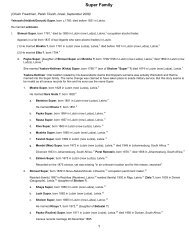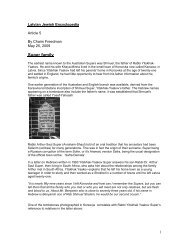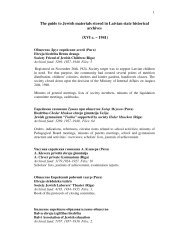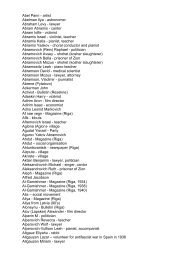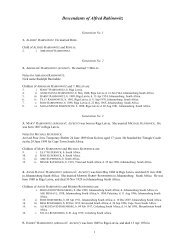Small Riga Ghetto
Small Riga Ghetto
Small Riga Ghetto
Create successful ePaper yourself
Turn your PDF publications into a flip-book with our unique Google optimized e-Paper software.
223<br />
work, and had contact with many Aryans from foreign countries who were<br />
also housed in this barracks camp but were free.<br />
Medical services were provided initially by Dr. Berkowitsch and later on by<br />
Dr. Jakobsohn. On 8 February 1944, 102 persons were taken away from this<br />
camp to the Dundaga satellite camp. Among them were Lewenstein, Pitum,<br />
Moisej Igdalski and others. Dr. Berkowitsch was also among them; he was<br />
tortured in Dundaga and sent back half-dead to Kaiserwald, where he was<br />
killed under unknown circumstances.<br />
In the summer of 1944 the Dünawerke barracks camp was closed down. The<br />
inmates were taken to Siauliai in Lithuania and from there to Stutthof. Regrettably,<br />
one of those who died there was the pretty Liesel.<br />
m) The Dondangen (Dundaga) Satellite or Labor Camp<br />
In the Kaiserwald card file Dundaga was called a work camp, but I can only<br />
call it an extermination camp, for it had practically nothing to do with work<br />
and a great deal to do with extermination! Only a few work crews went to<br />
work, and all of the others worked inside the camp. Dundaga is a well-known<br />
fishing town near the Baltic Sea, not far from the well-known Dundaga Forest.<br />
Formerly, prominent Latvian public men went boar hunting there. People said<br />
that Göring too once went on a boar hunt there.<br />
Now a training ground for some of Adolf Hitler's Leibstandarte (personal<br />
SS guards), the tank grenadiers, was set up there. But this plan could not be<br />
implemented because of the clayey soil, into which the "victorious tigers" (the<br />
tanks) sank too deeply in their training maneuvers.<br />
The actual "host" of the Jews was an SS division that also served as a guard<br />
unit. The whole division took orders from the commandant of Kaiserwald. Initially<br />
it was commanded by the SS man Greschel (Kroeschel) and later on by<br />
"Iron Gustav". There was no permanent housing at all. People lived summer<br />
and winter in tents whose floors were strewn with straw that did not give sufficient<br />
protection from the damp earth. A great hardship was the scarcity of water,<br />
not only for washing but also for drinking.<br />
The work consisted of building barracks for the soldiers stationed there.<br />
There were also a few other work crews, for example one that put up telegraph<br />
poles from Talsi to Stende and another that worked in the construction<br />
yard. The rations were so miserable that many people fell ill.<br />
There was no clinic. The sick inmates were given only two days off work<br />
and then sent to the central clinic in Kaiserwald. Thus Kaiserwald constantly



